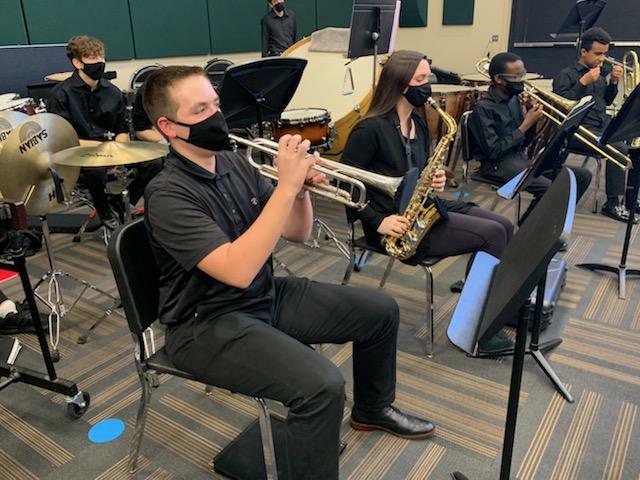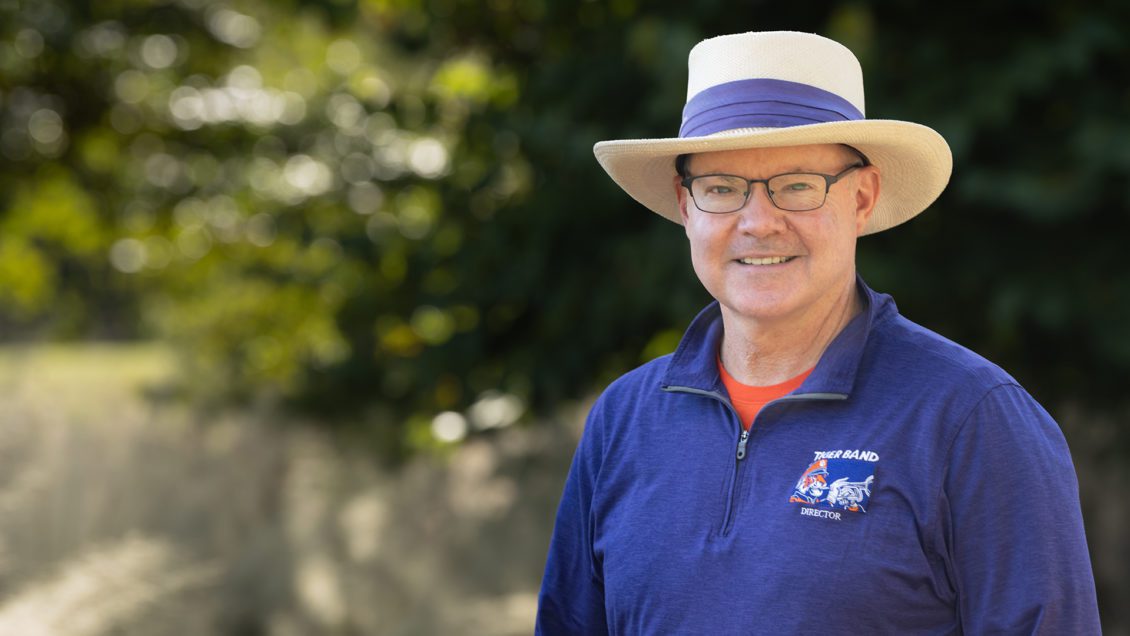As the Director of Bands at Clemson University and President of the College Band Directors National Association (CBDNA), Mark Spede faced the challenge of a lifetime when COVID-19 began to sweep the U.S. in early 2020. But instead of giving up hope for keeping the music going, he acted.
“Band director DNA is sort of — see a problem, fix a problem,” he says.
He immediately set up a COVID-19 response committee within the CBDNA to look at alternative teaching strategies for virtual band, reaching out to the National Federation of State High School Associations (NFHS) to coordinate efforts across high school and collegiate levels.
The connections sparked the International Performing Arts Aerosol Study, which would impact millions of students in the months ahead.
Where to start
“We were all struggling to know, how are we going to get through this? Is this going to decimate us?” Spede remembers. He began to research the impact of past pandemics on fine arts and found only a study on the spread of tuberculosis in the 1940s. His search for answers led him to Shelly Miller, a professor at University of Colorado, who specializes in air-quality research.
“I asked her if she would partner with us and do a study, because we just didn’t know if there was anything coming out of the end of the instrument,” Spede said.
He was involved in all communication efforts and interpreting the science for the musician and practitioner. I couldn’t imagine doing the study without him.”
PRofessor Shelly Miller, Lead Researcher, on Mark Spede’s contributions to the International Coalition Aerosol Study
Miller, herself a former high school flute player, was happy to help. She was able to get the first musician into a lab in June 2020, and she measured the amount of aerosol particles — those capable of carrying COVID-19 — that were emitted from the bell of a clarinet. Spede and James Weaver, director of performing arts for NFHS, eagerly awaited the results.
“She gave us the bad news. We’re looking at a pretty good amount of aerosol coming out of the clarinet,” Spede remembers. But hope wasn’t lost.
“Shelly’s team ran out to Target and bought some pantyhose, and we saw that if we put two layers of that on the end of the bell, it almost completely stopped the aerosol from escaping,” he said.
The ability to not only research the problem but find solutions soon gave the project momentum. Miller estimated the cost of the research at slightly over $300,000, so Spede and Weaver started making calls. In short order, they raised $332,000, which was not only enough to complete the study, which was recently published, but to set the stage for future research.
Nationwide impact
“Dr. Spede’s contribution was critical,” Miller said. “He was always thinking of practical ways to mitigate aerosol emissions while providing an understanding of what musicians could do — what was practical.”
As soon as Spede and Weaver began to see the results of the study, they began to convert their knowledge into real-world recommendations from the International Coalition Aerosol Study for performing arts groups to perform safely. Their guidelines included masking the student, masking the instrument (bell covers), social distancing, limiting rehearsal time, increasing air-change rates and proper hygiene. The makeshift solution of stretching pantyhose over instrument openings evolved into more specific recommendations for specialized masks and multi-layered MERV-13 filter bell covers.
Their recommendations were based on an early commitment to the theory that COVID-19 spread primarily through airborne transmission — a hypothesis that turned out to be correct.
The recommendations quickly caught on with music educator associations and health departments across the country, in states ranging from Vermont to New Jersey to Washington. Weaver estimates that he met with 38 state departments of health over the course of the pandemic, with several directly adopting the aerosol study’s recommendations into their own guidelines for schools.

Spede and Weaver began to make videos explaining safe performance practices, which soon garnered more than 130,000 total views from interested music educators, students and parents.
“I knew we were having an impact when we had parents visiting Clemson saying, ‘Aren’t you the aerosol study guy?’” Spede said.
To date, the study’s main page on the NFHS website has been viewed more than 560,000 times. When the NFHS surveyed approximately 3,000 performing arts programs, they found that about 85% had used some or all of their safety recommendations.
In a typical pre-pandemic year, Weaver says, 6.7 million K-12 students participate in performance groups. The NFHS as determined that the 2020-2021 school year, 4.5 million were able to return to performing — far more than they thought possible when schools closed down in spring of 2020.
“Truly, those 4.5 million students who returned back to music in 2021, it would have never happened without Mark Spede,” Weaver said.
The research from the International Performing Arts Aerosol Study is set to continue, examining carbon dioxide levels music classrooms across the country.
“This particular project has sparked off what’s going to be half a decade of research on air quality in the fine arts world,” Weaver said.
Spede’s contributions have been noted in media coverage ranging from the New York Times to the Los Angeles Times and by his peers.
“He kept up with the literature and other studies related to this topic. He was involved in all communication efforts and interpreting the science for the musician and practitioner,” Miller said. “I couldn’t imagine doing the study without him.”
One of his alma maters, the School of Music at Ball State University honored him with their 2021 Outstanding Alumni Award, and he was recognized with special awards from the American Academy of Teachers of Singing and Tau Beta Sigma. What’s most satisfying for him, however, is the impact of the work on students during the pandemic.
“Band was a safe-haven for all the other stuff in their lives,” he said.
Get in touch and we will connect you with the author or another expert.
Or email us at news@clemson.edu

